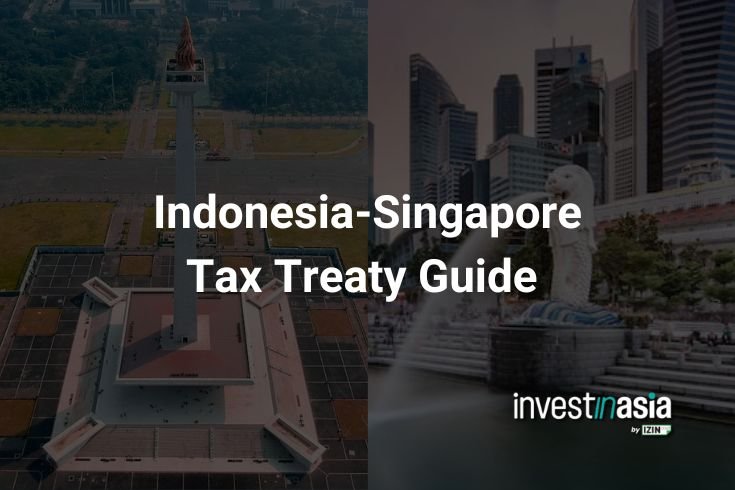Certified on May 11, 2021, under Presidential Regulation No. 35 of 2021, the updated Indonesia-Singapore double taxation agreement (DTA) entered into force, strengthening efforts to prevent tax evasion, increase the tax base, and boost investments between the two countries.
This updated treaty marks a significant step forward in the economic cooperation between Indonesia and Singapore, enhancing the bilateral investment climate and providing a robust framework for tax-related matters.
The revision of the DTA can further solidify Singapore’s status as a hub for international investments into Indonesia.
This article delves into the key changes introduced by the updated DTA, its implications for businesses and investors, and answers frequently asked questions about the Indonesia-Singapore tax treaty.
Also read: Tax Treaty: Definition, Models, How It Works
What is the Tax Treaty Indonesia-Singapore?
The Indonesia-Singapore tax treaty, originally signed in 1992, establishes rules to prevent double taxation and tax evasion between the two countries. This treaty covers various forms of income and establishes tax regulations for residents of Indonesia and Singapore.
The revised version of this treaty came into effect on May 11, 2021, aiming to enhance bilateral trade and investment by providing clearer tax guidelines and reducing the tax burden on cross-border transactions.
Also read: Indonesia’s PPN Guide: Rules, VAT Rates, Calculation
Key Changes in the Updated DTA


Introduction of Capital Gains Tax Protection
The new DTA introduces a provision for capital gains tax, allocating taxing rights on capital gains from the sales of shares and assets of Indonesian companies to the investor’s country of residence. This change excludes the sale of immovable properties and specific other exceptions.
Reduction in Branch Profit Tax Rate (BPT)
The branch profit tax rate has been reduced from 15 percent to 10 percent. This new rate does not apply to companies or residents of Indonesia or Singapore involved in oil and gas or mining contracts.
Lifting Restrictions on Treaty Benefit Relief
The updated DTA removes the limitation of relief, allowing tax residents of both countries to benefit from the treaty provisions without remitting income to their country of residence, subject to the principal purpose test (PPT).
New Provisions on Anti-Tax Avoidance
The new DTA includes an anti-tax avoidance article (Article 28) to prevent entities from exploiting the treaty benefits without genuine economic activity.
Exemption on Interests for Sovereign Wealth Funds and Government-Issued Bonds
While the general interest withholding tax rate remains at 15 percent, exemptions have been introduced for government-issued bonds, certain government institutions, and sovereign wealth funds.
Reduced Withholding Tax Rates for Royalties
The withholding tax rate for royalties has been reduced from 15 percent to 10 percent for certain intellectual properties and to 8 percent for the use of commercial, industrial, or scientific equipment.
Also read: Indonesia Corporate Tax Rate: Navigating the Business Landscape
Bilateral Investment Treaty (BIT)
In addition to updating their tax treaty, the Indonesia-Singapore Bilateral Investment Treaty (BIT) came into effect on March 9, 2021, replacing the previous BIT. The BIT provides specific legal protections for investors, such as access to international arbitration, thus safeguarding bilateral investments and boosting investor confidence.
Economic Impact and Cooperation


Indonesia and Singapore have substantial cooperation across various sectors, with total merchandise trade reaching S$48.8 billion (US$36.1 billion) in 2020. Singapore has been Indonesia’s largest foreign investor since 2014, with investments totaling S$13.2 billion (US$9.7 billion) in 2020.
There is also approximately US$300 billion worth of Indonesian assets in Singapore, highlighting the strong economic ties between the two nations.
Also read: Bali Tourist Tax Regulations 2024: Complete Guide
Hassle-free Indonesian Tax Management
Tax management in Indonesia can be time-consuming. For a simpler, hassle-free process, you can rely on InvestinAsia’s Indonesia tax consultant and compliance services. Our experienced team of professionals is ready to assist you in every tax matter, such as:
- Accounting and tax reporting services in Indonesia
- Indonesia Payroll Service
- Indonesia LKPM Reporting Service
- Indonesia VAT Taxpayers Registration
Contact us for a FREE tax consultation and get special offers!
The updated Indonesia-Singapore tax treaty is a crucial development in strengthening economic ties between the two countries. By addressing key tax issues and providing clearer guidelines, the treaty aims to foster a more favorable investment climate, encouraging increased bilateral trade and investment.
FAQs about Tax Treaty Indonesia-Singapore
Does Indonesia have a tax treaty with Singapore?
Yes, Indonesia has a tax treaty with Singapore. This agreement aims to prevent double taxation and tax evasion, thereby facilitating smoother economic transactions and investments between the two countries.
What are the tax rates under the Indonesia-Singapore tax treaty?
The tax rates under the Indonesia-Singapore tax treaty vary depending on the type of income. For example, the branch profit tax rate is reduced to 10 percent, and withholding tax rates for royalties are reduced to 10 percent and 8 percent depending on the type of royalty.
Is P3B the same as a tax treaty?
Yes, P3B (Perjanjian Penghindaran Pajak Berganda) is the Indonesian term for a tax treaty. Both terms refer to agreements between two countries to prevent double taxation and avoid tax evasion on income.
Also read: Tax Treaty Indonesia: Countries List and Complete Guide
Article reviewed by:
Tax Consultant of InvestinAsia



